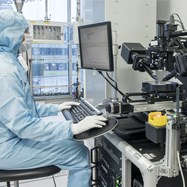Developing the bowel cancer screening programme – Imperial College London
There are one million new diagnoses of colorectal cancer annually worldwide. It is the third most commonly diagnosed cancer and the second most frequent cause of cancer death in the UK – incurring costs to the NHS in excess of £1 billion annually.
In 1993, Wendy Atkin, now Professor of Gastrointestinal Epidemiology at Imperial College, compiled evidence arguing in favour a one-off flexible sigmoidoscopy test which examines just the lower part of the colon (unlike a more invasive colonscopy which examines the whole colon), undertaken at around age 60 years. The idea was that polyps would be detected and removed as soon as feasible – providing enduring protection against the development of colorectal cancer.
Professor Atkin planned and established the efficient, patient-friendly processes that would be necessary to invite, screen and follow-up the whole population. She initiated a demonstration project in two areas of London (including a deprived, ethnically diverse region) that utilised specially trained nurse practitioners to perform the flexible sigmoidoscopy (she also worked with the nursing profession to develop the training programme in its early phase).
In 1993 a small feasibility study involving 4000 people was performed and a subsequent pilot trial with 16,000 people was undertaken in 1995. Then in 1996 a UK-wide multicentre, randomized controlled trial ? the UK Flexible Screening Sigmoidoscopy Trial (UKFSST) ? was initiated, involving 170,000 people.
In 2010, the first results of UKFSST were published. The trial showed that 11 years after a single screening, undertaken in men and women between ages 55 and 64, colorectal cancer incidence was reduced by a third and mortality by 43%. The model of delivery was shown to be feasible and cost-effective.
With government backing, the entire screening strategy was rolled out in a national programme from 2013 and is expected to cover the entire population by 2016.
It has been estimated that flexible sigmoidoscopy screening at age 55 will prevent 5,000 colorectal cancer diagnoses and 3,000 deaths in the UK each year, and rectal cancer could be rendered a rare disease.
-
Hamir Patel
hamir.patel@russellgroup.ac.uk
020 3816 1316
-
Stephanie Smith
020 3816 1310
 X
X


